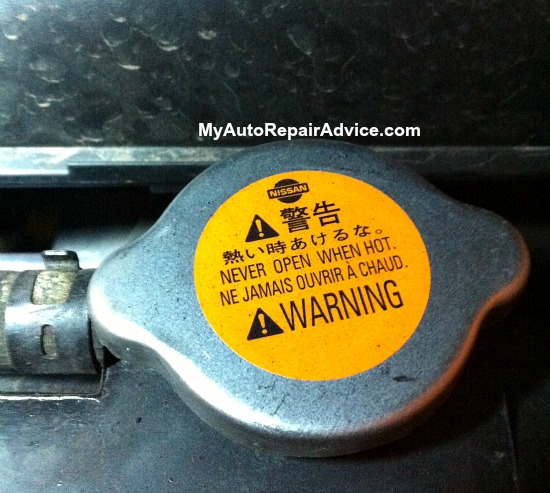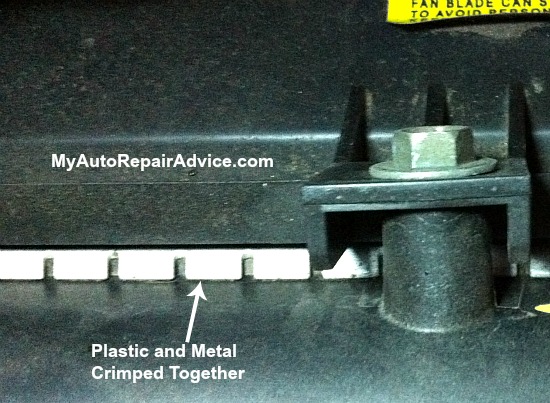Car Radiator Repair
Car radiator repairs are not as simple as they used to be. Radiators used to be made of all aluminum which you can weld or braze. Most of the time if you found a leak in your radiator you could simply fix it. This is not usually the case with today's cooling systems. Most of them are made of plastic sides with an aluminum core. The plastic ones are not repairable in general.
The Truth About Car Radiator Repairs
What you may have heard: "You can do a radiator fix yourself, just solder your radiator fins or neck"... "Try some kind of adhesive or putty to stop the radiator leak" or "There is no way to fix radiators".
The truth: Old classic car radiators used to be made completely of metal, typically brass or copper so you could simply use metal fillings to patch and repair them. You could just solder or braze them and this would restore them back to a fairly decent working condition.
New car radiators are made of at least two things. The first is aluminium. Automobile manufacturers use this as the "core" or, the part that does the heat exchange. Aluminium is much harder to repair than the brass or copper radiators that cars used to use. The cores of these radiators are thin so they cannot be welded and brazing can sometimes work, but it is hard to get the hole sealed.
The second thing that new car radiators use is plastic. They use plastic tanks on both sides of the core and they crimp the plastic tanks to the aluminium core. These crimped joints are sometimes prone to leakeage. While some radiator repair shops can re-crimp these joints they have to have special tools and equipment to do this. There is no way to fix these joints without special tools.
In addition to this, most cars and trucks today also have a transmission cooler built into the radiator. Any time you see red oily fluid mixed in with the coolant you have to suspect a transmission fluid leak into the coolant. The only good way to fix this is to replace the radiator.
In a
minority of cases you can repair the plastic side tanks by using a
plastic welding kit. Plastic welding is not easy and you would need a
good amount of experience in order to fix a radiators plastic tank, but
it can be done by someone who knows what they are doing.
How About Using Raditator Adhesive?
As far as adhesive and sealants are concerned, my advice is never use them. Adhesives and sealants are temporary fixes at best. Even if they do work for a while, it won't last.
The only way to permanently fix your problem is to actually repair it or to buy a new one. Sealants often cause more problems than they fix because many types of sealants actually clog up your cooling system and cause many more problems than your leaky radiator. I consider these types of sealant products total scams.
Don't get me wrong, I've used things like JB Weld to repair plastic radiators in a pinch and sometimes the repairs do last quite a while. The problem I have found is that this type of fix can fail at any time. If you only use the vehicle to go short distances then this might work fine, but if you are looking for a reliable, long term fix then adhesive is not the way to go.
Can I Repair a Plastic or Aluminum Radiator?
Radiators are not what they used to be, but many of them can be repaired. The only good way to have one repaired is to take it to a professional radiator repair shop. Any good one will have the tools to install new tanks onto the radiator, and possibly repair the aluminium core if needed.
The most common place for a radiator from a new car to leak is either from the hose connections, which can be it's own challenge, or from where the aluminium core meets the plastic tanks on the side.
My Final Advice is that NO, you should not try to repair plastic or aluminium radiators. If it is from an old vehicle and you are good at soldering and brazing, then you could try it, as long as you inspect it periodically, but for any new car you will be wasting your time and will most likely waste a lot of money.
If you still have any unresolved vehicle problems or questions, you can ask an auto mechanic online. For expert answers specific to your vehicle's make and model, I recommend JustAnswer Car. They have a large pool of certified mechanics to answer your questions for a small fee and you can also browse their answers to other users for free.
VEHICLE COOLING SYSTEM


New! Comments
Have your say about what you just read! Leave me a comment in the box below.